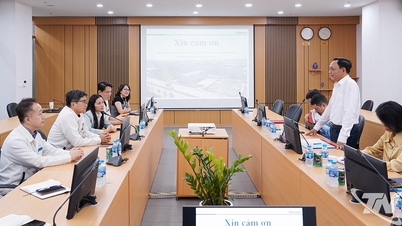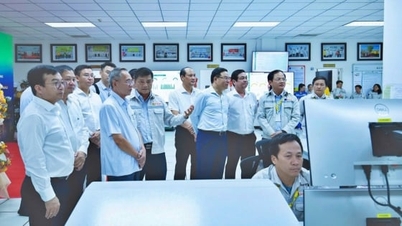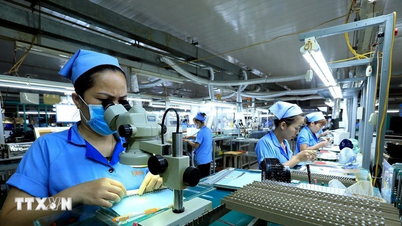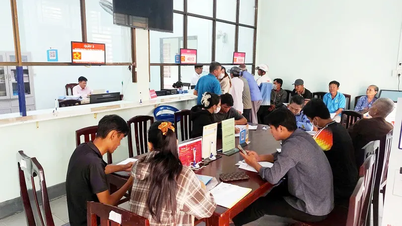Banks and businesses have coexisted
To promote the key role of the private economic sector, especially SMEs, in promoting growth, creating jobs and spreading innovation, Resolution 68-NQ/TW on private economic development has proposed a series of strategic support policies, in which bank capital is identified as one of the key channels to support the development of the SME sector.
In fact, SMEs are always one of the sectors that the State Bank of Vietnam (SBV) directs credit institutions to prioritize lending to. According to Ms. Ha Thu Giang, Director of the Department of Credit for Economic Sectors (SBV), as of September 29, economic credit increased by 13.37% compared to the end of 2024. In particular, data shows that capital flows in the right direction, about 78% of outstanding loans of the economy serve the production and business sectors. Loans to SMEs account for 19.04% of outstanding loans of the economy.
In interest rate management, the State Bank continues to maintain operating interest rates at low levels to guide the market to reduce lending interest rates; at the same time, direct credit institutions to reduce operating costs and promote the application of information technology to lower lending interest rates to support businesses and people.
To date, the lending interest rate continues to trend downward. The average interest rate for new loans is currently at 6.52%/year, down about 0.41% compared to 2024.
Mr. Nguyen Van Than, Member of the 15th National Assembly , Chairman of the Vietnam Association of Small and Medium Enterprises, assessed that over the past years, the banking sector has made great efforts to support the business community. During the difficult period due to the Covid-19 pandemic, natural disasters and economic fluctuations, the State Bank has shown its role in accompanying the business community by issuing many policies and mechanisms, directing credit institutions with many solutions such as reducing operating costs, thereby reducing interest rates, service fees, restructuring debts, maintaining debt groups, debt forgiveness, debt extension... to help businesses overcome challenges and restore production and business.
“It can be said that in the most difficult period, banks are the “lifesavers” that help hundreds of thousands of businesses survive and restore production and business activities,” Mr. Than affirmed.
Currently, many commercial banks, especially the group of State-owned commercial banks, have established specialized departments for SMEs, designed priority credit packages, financial consulting programs, and coordinated with the Association of SMEs to organize many conferences connecting banks and businesses to listen and remove obstacles.
As a construction enterprise in Son La, Mr. Nguyen Huy Bay, Director of Son Hung Trung Company Limited, said that the bank has provided timely support with reasonable interest rates, creating favorable conditions for businesses to maintain and develop. There were times when the market economy was stormy and interest rates were high, but the bank was still flexible in reducing interest rates to help businesses restore production and stand firm in the face of challenges. Mr. Bay said that Resolution 68-NQ/TW dated May 4, 2025 of the Politburo was issued with many preferential mechanisms for SMEs like Son Hung Trung. With the support of bank capital, the company plans to expand its high-tech brick factory with an investment capital of 100 billion VND, with the goal of strongly applying technology to minimize greenhouse gases and impacts in the production process on the environment, towards green, clean, and friendly production in accordance with the Government's policy.
 |
| Bank capital is identified as one of the key channels to support the development of the SME sector. |
Wider access to capital
Although the interest rate level is low and banks have many preferential policies for customers, the capital absorption capacity of enterprises has not improved much. The main reason for this situation, according to Mr. Than, is that many SMEs still have limitations in management capacity, financial transparency and loan records. Many micro-enterprises and individual business households do not have audited financial reports and lack feasible business plans. "We must recognize that credit growth cannot be based on will, but must be based on the actual capital absorption capacity of the economy and trust between banks and enterprises. And in fact, lending banks must ensure debt collection," the Chairman of the Association of Small and Medium Enterprises emphasized.
Another important reason is that the current system of credit guarantee funds and SME development funds at the central and local levels is not operating effectively. Small capital scale, complex processes, and scattered authority mean that these funds have not really become an “extended arm” to support businesses.
In that context, Resolution 68-NQ/TW is considered a new opportunity and direction to help increase capital absorption capacity for the SME sector.
According to Mr. Le Hoai An, a banking training and consulting expert, the important breakthrough of this Resolution is to fundamentally change the approach to bank credit. Instead of depending on traditional collateral such as real estate or machinery, the new policy encourages credit institutions to shift their focus to evaluating cash flow, business plans, intangible assets and even unsecured loans.
Along with that, banks are also encouraged to develop specialized credit products for the SME group, instead of applying a general model as before. In addition, Resolution 68-NQ/TW also strengthens the role of credit guarantee funds and the SME Development Fund. Notably, the Resolution requires expanding the guaranteed subjects, minimizing administrative procedures, and at the same time making the disbursement process transparent for easy access by businesses.
However, in order to take advantage of the opportunities that are present, Mr. Than believes that businesses themselves need to strengthen their internal strength to ensure enough "health" to develop strongly and sustainably. "Businesses must make more efforts themselves, invest in governance, digital transformation, financial transparency, and build trust with credit institutions. When businesses are stronger, have feasible projects, and good governance, banks will "open their doors" more easily," Mr. Than emphasized.
On the State side, the Government will soon submit to the National Assembly amendments to the Law on Support for SMEs, which specifically stipulate tax reductions for the entire SME sector to nurture revenue sources and support businesses to reinvest in production and business, especially in the context of export difficulties due to global trade tensions. At the same time, it will shift from widespread support policies to in-depth support - prioritizing businesses with orientations towards digital transformation, innovation and participation in international supply chains. Along with that, it will simplify the "post-audit" process, so that businesses can confidently access interest rate, tax and public finance support programs without fear of legal risks.
Source: https://thoibaonganhang.vn/nuoi-duong-mach-mau-de-doanh-nghiep-lon-manh-172395.html


![[Photo] Special class in Tra Linh](https://vphoto.vietnam.vn/thumb/1200x675/vietnam/resource/IMAGE/2025/11/14/1763078485441_ndo_br_lop-hoc-7-jpg.webp)



![[Photo] Deep sea sand deposits, ancient wooden ship An Bang faces the risk of being buried again](https://vphoto.vietnam.vn/thumb/1200x675/vietnam/resource/IMAGE/2025/11/13/1763033175715_ndo_br_thuyen-1-jpg.webp)




































































































![Dong Nai OCOP transition: [Article 3] Linking tourism with OCOP product consumption](https://vphoto.vietnam.vn/thumb/402x226/vietnam/resource/IMAGE/2025/11/10/1762739199309_1324-2740-7_n-162543_981.jpeg)






Comment (0)